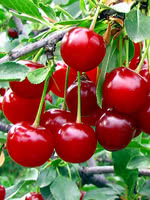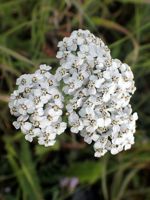Mon-Fri 9am - 5pm Mountain time
Valentine Cherry vs Yarrow
Prunus x kerrasis Valentine
Achillea borealis (Previously Achillea millefolium)
NOT AVAILABLE THIS SEASON
NOT AVAILABLE THIS SEASON
(new stock expected: fall of 2026)
Valentine Cherry is a hardy deciduous shrub and hybrid variety of the University of Saskatchewan Sour Cherry released in the Romance Series of dwarf sour cherries in 2004. This medium-sized self-pollinator produces tart, bright red fruits in large clusters in late summer that are perfect for jams, pies and jellies. Valentine Cherry is ideal as a landscape or orchard tree.
Yarrow is a herbaceous, native wildflower that is found across Canada. It features large, flat clusters of tiny white flowers. The blooms attract a variety of pollinators, making it an ideal choice for pollinator gardens. While partial shade is tolerated, the best flowering occurs in full sun. Yarrow is resistant to deer and rabbits, making it both a beautiful and practical addition to your landscape.
The entire plant is edible, but leaves and flowers are most commonly consumed. They have a strong licorice scent and a mild sweet flavor that is similar to tarragon. Yarrow leaves can also be used as a natural insect repellent.
It is important to plant Yarrow in the right place, it can spread quickly via both rhizomes and self-seeding. Deadheading the spent flowers will extend the bloom season and can help limit self-seeding.
Valentine Cherry Quick Facts
Yarrow Quick Facts
Toxicity: toxic to dogs, cats, and horses

